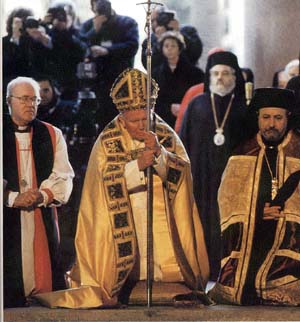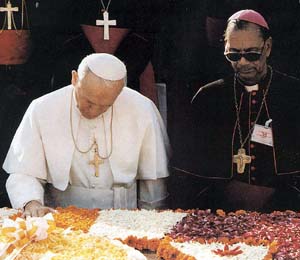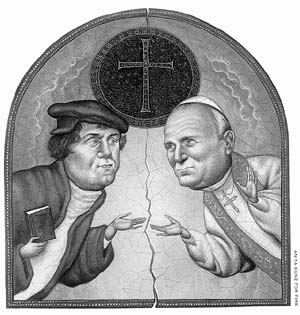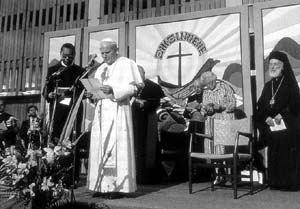 |
Interviews
Los Angeles Mission editor Christopher Zehnder interviews
Atila Sinke Guimarães on his book Quo Vadis, Petre?
Published in L.A. Mission, January 2000
1. Christopher Zehnder: Did the October 1999 pan-religious meeting that has taken place in any way encourage you to write this book?
Atila S. Guimarães: The expression "encourage you" seems to me somewhat ironic. In the pan-religious meeting, nothing took place that in any way “encouraged me.” It appears to me that the Holy See came to an understanding beforehand with the religions present at the meeting that they would send representatives of a secondary level. Also the coverage given to the meeting was less than what was expected. These measures, different from the original plans, seem to have been taken due to pressure from one wing of Cardinals who were not favorable to the meeting.
However, if my hypothesis is correct, John Paul II and the other wing of Cardinals made a small strategic retreat. They did not turn away from the plan, and will probably return to the offensive as soon as they can. In face of this reality, the true Catholic should be paying close attention to the other steps that will be taken by one or the other wing in order to see how he can help to make the interests of the Church conquer. This seems to me the only serious position. It is the one that I have been trying to take. To be encouraged or discouraged for me is secondary.
2. CZ: Were your worries confirmed?
ASG: Yes, with certain nuances. Yes, because despite the smaller coverage than expected, the pan-religious program of the meeting was carried out as planned. And for anyone who understands the profundity that this type of symbolic event has before God and History, the gravity of what took place at the Vatican was not diminished in relation to what was predicted.
Now for the nuances. The final document of the meeting and the closing papal speech to the Assembly presented a surprising “turnabout” to what generally takes place in these inter-confessional meetings. Since the dream of harmonizing all the various religions is very difficult to realize in the doctrinairy sphere, the inter-confessional dialogue until now has based itself on some common non-religious points in order to give the impression that the process is going forward. For this, the themes of these meetings revolve around peace, women’s liberation, youth education, environmental concerns, etc. At the end of each meeting, the participants issue some more or less vague proposals without many practical consequences. A kind of ethereal philanthropism of lay inspiration with ecological tones.
At the October meeting, there was a considerable change. In the two documents I mentioned, the main theme was a call to the struggle for the liberation of the poor. This force was turned principally against the economic system in the West, that is, capitalism. Therefore, the seeds of a new “liberation theology” embracing all the religions are being thrown out. The Latin-American “liberation theology” of the 70s and 80s was an invasion in the temporal sphere made by Catholic ecclesiastics with views of “liberating” the poor from the “structures of sin” - capitalism.
Now it seems that we are witnessing something of this nature on a world scale. The difference between the first “liberation theology” and the second would be that the latter would not use armed violence. It will probably be inspired in the method of Mahatma Gandhi in order to liberate India from English dominion.
Thus, the October meeting not only confirmed my concerns in the religious ambit, but also increased them, extending them into the temporal sphere.
3. CZ: Do you now have greater or less concern about the future of the Church's ecumenism?

JP II opens the Holy Door for the Jubileee with Anglican Carey and Schismatic Athanasios - 30 Giorni, January 2000 |
ASG: The concern that I have about ecumenism and inter-religious dialogue is expressed in my book Quo Vadis, Petre? It remains exactly the same.
4. CZ: Please comment on the following statements made by Cardinal Francis Arinze, president of the Pontifical Council for Inter-Religious Dialogue, who said that these inter-religious initiatives have served to appreciate the desire of Catholics to meet with other believers, and to address in greater depth the Church's mission, which preaches Jesus Christ, the only Savior of all mankind. Here is Arinze's statement: "This is important. Many Catholics feel a certain confusion, because they think that to open to other believers in a certain sense means to betray the Christian ideal. Although the risk exists, there is an answer to avoid it. By being firm in the faith, we can meet with other believers, share with them the beauty of the news of Christ's salvation, and show genuine interest in what they believe, what they do, and how they worship. In this way, greater solidarity and collaboration can be promoted in today's world."
ASG: To analyze of the statements of Cardinal Arinze would require a lengthy article in itself. It is not possible to do this in an interview.
5. CZ: Though Konrad Raiser might equate such an ecumenical meeting as he proposed with an ecumenical council, is it clear that the Vatican so equates it?
ASG: Msgr. Euleuterio Fortino, under-secretary of the Pontifical Council for the Promotion of Christian Unity, told the French newspaper La Croix that the council "has given its nod of approval to Konrad Kaiser's suggestion to hold a 'universal Christian council' around the year 2000." It is a "proposal fully shared by the Vatican", said Msgr. Fortino. These and other statements of the Vatican Prelate are cited in my book. I believe that they are quite clear and respond to your question.
6. CZ: Is there no way that the Catholic Church could meet with non-Catholics in a meeting without causing the scandal of indifferentism?
ASG: Your question presupposes that it is falling into religious indifferentism. In my letter to John Paul II, I do not go that far. I do not remember having affirmed the presence of the “scandal of indifferentism.” I ask the Pontiff how to avoid thinking that the present-day direction of the Catholic Church is clashing with prior pontifical condemnations, among them that of indifferentism. Therefore, I am not placing myself in the position of judge, but of the faithful. Your affirmation is more daring than mine. I prefer to remain with mine.
7. CZ: Is it clear that the “common martyrology” as proposed by the pope is tantamount to canonization?
ASG: The word martyrology is a term consecrated in the Catholic tradition to designate the list of Saints canonized by the Church. It is not the list only of martyrs, as one might think, but of all the canonized Saints. As far as I know, the new expression "common martyrology" was coined by John Paul II in the Encyclical Ut Unum Sint (n. 84) and, since then, has been used constantly by Vatican organs and personages. By the former usage that the word had, everything leads one to suppose that the "common martyrology" will include the Saints of the Catholic Church and those who are considered saints by other religions.
To be admitted into the Catholic martyrology, the latter group would have to be canonized. This interpretation seems to be the only one that would be consistent with the past. I do not know of any official declaration that says anything different. Therefore, the “saints” of Protestantism, for example, who would enter the "common martyrology" would have to receive the acknowledgement of the Catholic Church. Such acknowledgement is called canonization. We are facing the possible canonization of Luther, Calvin, Zwingli, etc.
8. CZ: Does such a common martyrology indicate that salvation outside the Church is normal, when martyrdom itself is an extraordinary grace?
ASG: Let me distinguish the two parts of your question. In the second part, there is the common confusion between the concept of martyr and that of martyrology. I hope that the solution was clearly presented in the answer to the last question. I respond, therefore, only to the first part of the question. Yes, I believe that admitting that there are saints in other religions supposes that these persons are in eternal glory. This is equivalent to saying that there is salvation in other religions. Does this harmonize with the perennial Catholic doctrine? There seems to be a flagrant contradiction. For this reason I direct myself to John Paul II asking that he explaining the contradiction.
9. CZ: One might argue that your speculation that, in the future, Muslims who died during the Crusades and formal heretics might be considered martyrs is an exaggeration unwarranted by the facts. After all, the pope speaks only of those who, at best, are presumably material heretics and Msgr. Sepe speaks only of martyrs of atheistic regimes.

John Paul II praying on his knees at the tomb of Gandhi - 30 Giorni July 8, 2000 |
ASG: Your question is not exactly a question; it is a manifestation of an opinion contrary to mine. Departing from the presupposition that your interpretation is right, you fault me for exaggeration. I do not know of any negation of the facts that some heresiarchs – such as Luther – or some Muslims could be included in the new common martyrology. On the contrary, various recent actions from the highest cupola of the Church are moving in the direction I indicated.
For example, in the Catholic-Lutheran accord signed on October 31, the city chosen for the event was Augsburg, Germany, in order to pay homage to Luther. In 1530 Luther officially founded the Protestant religion there. How can one not see this homage as an attempt to pretend that Luther was not wrong? The text of the accord follows this same line. Now, if Luther were not wrong, it would have been a great injustice to have condemned him as a heretic. He would be, then, one who was greatly persecuted, a type of saint. This is what underlies the accord and the ceremony of October 31.
Let me give another example. On the trip that John Paul II made to India at the beginning of November, the private prayer he made next to the tomb of Gandhi, the fact that he took off his shoes to approach the place and then sprinkled rose petals over the sepulchre are actions normally considered symbolic expressions of a great admiration. If this example from above were followed by many Catholics, we would see the spread of an admiration for Luther and for Gandhi that would approach the veneration tributed to saints. From public veneration to canonization, the step nowadays is not so large. The facts point to this direction. Therefore, I do not see why you state that my prediction is unfounded and exaggerated.
10. CZ: What do you find wrong in the pope's desire to make a "more just and honest portrait of Luther"? Such a portrait should not necessarily lead to an exoneration of his heresy.
ASG: The expression "to make a more just and honest portrait of Luther" contains an implicit judgement that the prior sentence of the Church with regard to the heresiarch was not entirely just and honest. However, the condemnations made of Luther were the conclusions of two Ecumenical Councils: the Fifth Lateran Council and the Council of Trent. The doctrinairy decisions of these two councils were sealed by Papal Infallibility. This is equivalent to saying that these sentences cannot contain error. Therefore, the above expression tends to relativize the prior condemnations and to favor Protestantism.
11. CZ: Could Luther in no way be deemed "profoundly religious"? Must we assume the complete dereliction his character?

Making a kinder portrait of Luther implicitly denies the prior condemnations of the Church - Time, July 6, 1998 |
ASG: In theory, every heresiarch can be considered to be "profoundly religious," because his error was a religious error that profoundly affected him. But in the context in which this expression was employed regarding Luther, it has the sense of an eulogy. Up to Vatican Council II, eulogies of heretics were considered as a sign of suspicion of heresy. The crime of suspicion of heresy was always held to be one of the most serious in the bosom of the Catholic Church, surpassed only by the incursion into declared heresy. I do not know of any official document revoking the existence of the suspicion of heresy.
When someone is declared a heretic – as in the case of Luther – the recommendation of prudence that rules in the Church is to remove oneself from him. This is not to say that everything in the character of the heretic is bad, but it must be said that the error which he professed cannot be disassociated from his person. I think this norm is very wise. An analogous law of prudence warns that a cup of poisoned water should be avoided, because the poison – even if it is only a drop – spreads throughout the water. To accept positive points of Luther, even if in thesis they exist, in practice would be similar to drinking the poisoned water of the cup under the pretext that the poison is only in one drop.
12. CZ: Too, what is wrong with finding "points of convergence" between Protestants and Catholics? Such an approach was followed by St. Peter Faber, Jesuit missionary to the Protestants in Germany in the 16th century. His approach seems very close to John Paul II's. Allow me to quote a letter of his.
"Whosoever desires to become useful to the heretics of this age must be solicitous to bear them much charity and to love them truly, excluding from his mind all thoughts which tend to cool his esteem for them. Secondly, it is necessary to gain their good will, so that they may love us and keep a place for us in their hearts. This we can achieve by familiar intercourse with them, speaking of the things we have in common and avoiding all contentious argument... When we meet a man, not only perverse in his opinions but evil in his life, we must set about to persuade him to abandon his vices before speaking to him of his errors in belief.
"It has happened to myself, for instance, that a man came wanting me to satisfy him about some erroneous views that he held, especially concerning the celibacy of the clergy. I dealt with him is such a way that he unburdened his conscience to me, on which lay the mortal sin of many years' concubinage. I persuaded him to abandon that life... and no sooner had he done so and found himself by God's grace able to live without a woman, than he also renounced his errors, without saying another word about them... Such people have need of admonitions and exhortations on morals, on the fear and love of God, on good works, to counter their frailties, distractions, tepidities and other afflictions, which are not principally or in the first place from the understanding, but from the hands and feet of the body and soul." [quoted on page 126 of The Dividing of Christendom by Christopher Dawson]

Praying at the World Council of Churches in Geneva - Actualite Religieuse, Special Edition, 1995 |
ASG: In the quotation you present, it is clear that the goal of the missionary was to convert the Protestants (see underlined texts) and to bring them from heresy into the bosom of the Holy Catholic Church. Having this end, at times the missionary norms of the Church admitted exceptions, such as that which you point out. I do not have objections to this. However, since Vatican II the leadership of the Church has stopped recommending the conversion of heretics. On the contrary, it has even been said that they do not need to be converted and that they can achieve eternal salvation in heresy. Thus, the same attitudes, formerly explained in function of the end, today, without the objective of converting the heretics, have taken on the characteristics of a collaboration.
13. CZ: In light of the above quote, could it not be that the pope, perhaps erroneously, thinks his ecumenical outreach is ordered, in the words of Pius XI, to "promoting the return to the one true Church of Christ of those who are separated from it"?
ASG: If the Catholic Faith is no longer required to belong to the Church, this Church will no longer be the Catholic Church. As for the interior dispositions of the Pope John Paul II, I do not have the elements to give an opinion.
14. CZ: On page 42 [of “Quo Vadis, Petre?”] you write, that the Vatican II Council stated that "there is a possibility of salvation in the practice of innumerable religions." Does the council say this, or simply that some in non-Catholic religions may be saved? The difference being, of course, that they are saved though they are in those religions, but not through them.
ASG: The decree Unitatis Redintegratio (3c, 3d) clearly states that salvation can exist outside of the Church. It is this text to which I refer: “The brethren divided from us also carry out many of the sacred actions of the Christian religion. Undoubtedly, in ways that vary according to the condition of each Church or Community, these actions can truly engender a life of grace, and can rightly be described as capable of providing access to the community of salvation. …. For the Spirit of Christ has not refrained from using them as means of salvation ….”
You can see that Vatican II is quite clear regarding salvation outside of the Catholic Church. I could cite other excerpts. I hope this single text will resolve your doubt.
15. CZ: It seems that the pope goes out of his way to see something positive in everything - a tendency that can be problematic and confusing in an age that makes few distinctions. To what degree do you think this habit of the pope's to be merely a matter of policy or a symptom of a deeper theological bent?
ASG: It is my principle not to judge the internal intentions of individuals. I analyze only external actions. Doing this, obviously, I try to discern the direction they incline toward and the tendencies they actually realize. Thus, I have no opinion about the hypothesis you raise that John Paul II would be moved by the good intention of seeing only the positive side in everything. I respect your opinion, but I do not have the elements to know if it is true or not. The question that you raised about “this habit of the pope to be merely a matter of policy or a symptom of a deeper theological bent” seems to me without the necessary base in concrete reality.
|
Interviews | People Saying | Traditionalism | Home | Books | CDs | Search | Contact Us | Donate

© 2002-
Tradition in Action, Inc. All Rights Reserved
|
 |
|